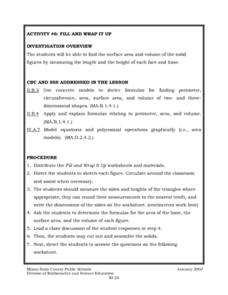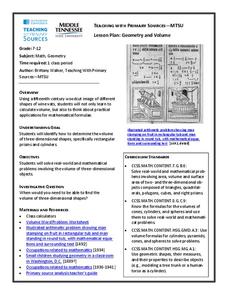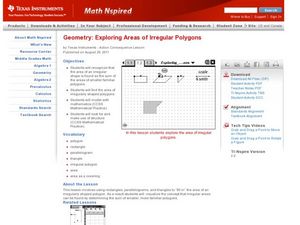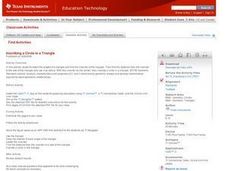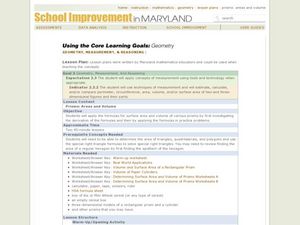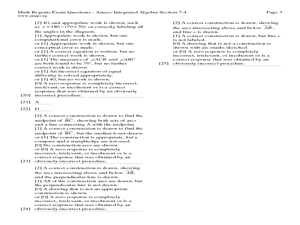Curated OER
Geometry: Area Project
Sixth graders identify and use area formulas for finding the area of geometric shapes.
Curated OER
Area and Perimeter Problem Solving Retest
In this math worksheet, students solve 6 story problems in which area or perimeter is calculated. These are construction related problems that students must solve and indicate if area or perimeter is used. The meaning of the title is...
Curated OER
The Trapping of Trapezoids
This is a nice hands-on activity where young geometers create trapezoids and calculate their area by looking at areas of quadrilaterals and triangles.
Curated OER
Connecting Formulas Related to Geometric Figures
Students identify diagrams of quadrilaterals and circles by different names and classify the figures. They name the areas for each diagram and practice solving the formulas for each.
Curated OER
A Special Relationship
Learners discover the relationships of the lengths of the sides of right triangles and right triangles using a series of drawings on dot paper. They investigate and solve problems of standard (customary and metric units) and non-standard...
Curated OER
Pacing a Gunther Chain
Students pace a Gunther Chain, a measurement used by foresters to determine distance and area. They discuss that pacing is individualized depending on age, gender, etc. They practice to find an average pace. Teams estimate, pace and...
Curated OER
Fill and Wrap It Up
Students find the surface area and volume of the solid figures by measuring the length and the height of each face and base. They use concrete models to derive formulas for finding perimeter, circumference, area, surface area, and volume...
Virginia Department of Education
Geometry and Volume
The history of math is fascinating! Utilize a woodcut primary source image from 1492 and posters from the 1930s to help geometers apply their volume-calculation skills to real-life questions.
Curated OER
Area-Time to Get in Shape
Students investigate the properties of triangles and parallelograms. In this geometry lesson, students calculate the formula used to find the are of a triangle and other polygons. They create a visual model to represent their findings.
Curated OER
Exploring Area
Tenth graders calculate the area of various shapes. In this geometry lesson, 10th graders use isometric paper to draw shapes. They identify their shapes by name and calculate how many triangles will fit in the area of a shape.
Curated OER
Length, Perimeter and Area
Learners analyze characteristics and properties of two- and three-dimensional geometric shapes and develop mathematical arguments about geometric relationship
Curated OER
Review of Triangles
Students investigate the Pythagorean Theorem. For this geometry lesson, students define angles and sides of right triangles. They calculate the area and surface area using formulas derived by the Pythagorean Theorem.
Curated OER
Exploring Areas of Irregular Polygons
Students solve for the area of different polygons. In this geometry lesson, students identify and differentiate between regular and irregular polygons. They use properties of irregular polygons to solve problems.
Curated OER
Inscribing a Circle in a Triangle
Pupils investigate inscribing a circle in a triangle. They use Cabri Jr. to draw a triangle, locate the incenter, and use the distance from the incenter to a side of the triangle to inscribe a circle. The dynamic nature of the geometry...
Curated OER
Scale Factor Area Perimeter
Mathematicians compare triangles at different scales. In this geometry activity, learners calculate the area and perimeter of triangles. They use the Ti to make observation of the change that takes place as the triangles are dilated.
Curated OER
Geometry, Measurement & Reasoning
Students measure prisms and determine their volume. For this measurement and reasoning lesson, students estimate the volume and area of prisms. They measure given boxes. Students use paper to create prisms and cylinders. They determine...
Curated OER
Properties of the Centers of a Triangle
High schoolers investigate properties of the four centers of a triangle and explore a special property of the circumcenter and orthocenter of a triangle. This lesson requires the use of Cabri, Jr.
Curated OER
Area, Perimeter, Circumference
Sixth graders use different measuring tools to measure area, perimeter, and circumference of different shapes. In this measurement lesson plan, 6th graders measure parallelograms, triangles, and circles.
Cord Online
Pyramids and Cones
Young mathematicians find the surface area and volume of a square pyramid and a cone. In what looks like a typical activity out of a textbook, you'll find an activity where learners find an unknown measurement of a pyramid or...
Mathematics Assessment Project
Discovering the Pythagorean Theorem
Young mathematicians join the ancient order of the Pythagoreans by completing an assessment task that asks them to find the area of tilted squares on dot paper. They then look at patterns in the squares to develop the...
Teachers Network
A World of Symmetry: Math-Geometry
Define and identify the three basic forms of symmetry translation, rotation, and glides with your class. They cut out and arrange paper pattern blocks to illustrate symmetry, create a Cartesian graph, and design a rug with a symmetrical...
Curated OER
Twenty-Five Measures of the Angles of a Triangle Problems
In this triangle worksheet, young scholars calculate the measures of the angles or the sums of the measures of the angles in twenty-five triangle problems and hands-on activities. The solutions are provided.
Curated OER
Why can't We Use SSA to Prove Triangles Congruent?
Students investigate triangles and congruences. For this geometry lesson, students differentiate between inductive and deductive reasoning. They differentiate between similar and congruent triangles.
Curated OER
Areas of Polygons
Students calculate the are of regular polygons. In this geometry lesson plan, students create polygons on the computer and move it around to create different shapes. They explore the area of different polygons and how they inter-relate.






